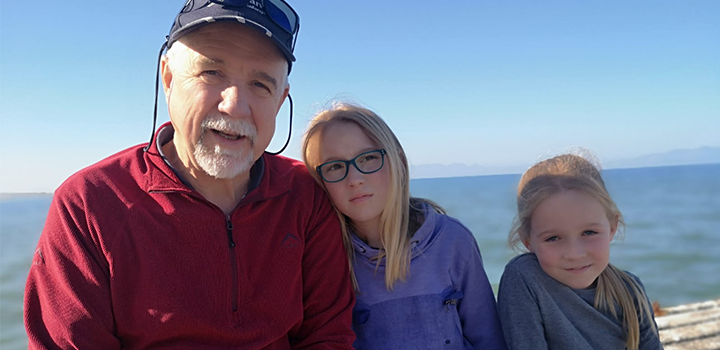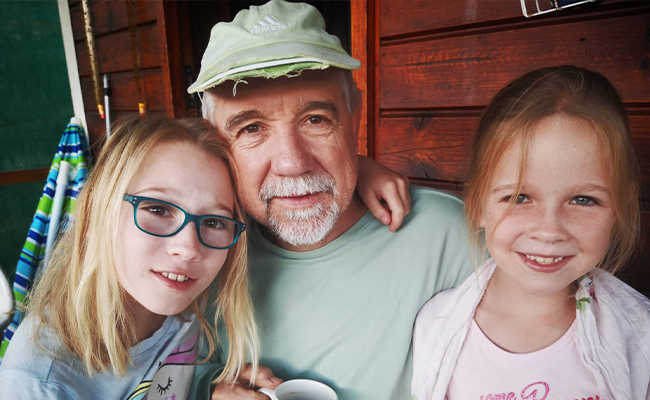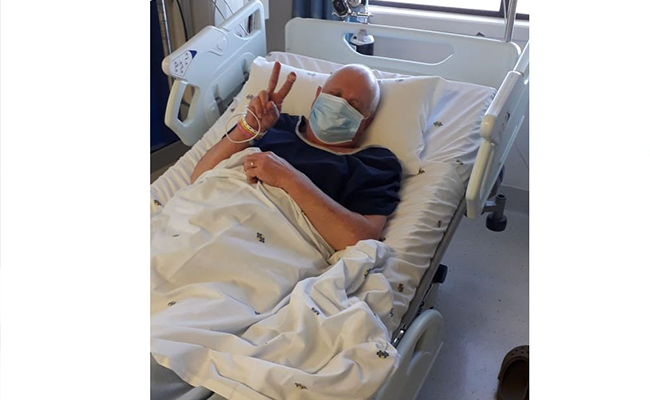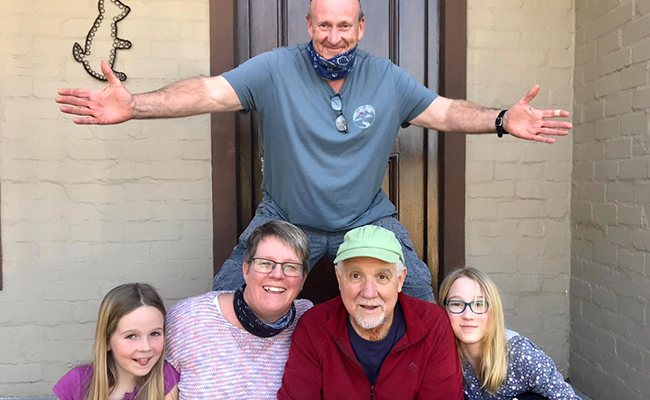Chris Bateman: The grace of adversity – my cancer journey

63-year-old Chris Bateman was diagnosed with esophageal cancer in November 2019. Chris is based in Cape Town, is married to Suz and has two daughters – Hannah (12) and Kate (9). Now on the road to full recovery from stage one esophageal cancer, he shares his story in his own words.
Chris Bateman is a veteran freelance healthcare journalist and former news editor of The SA Medical Journal. He has also written content for Discovery Health for many years. Now, he writes his own story for us.
The grace of adversity – my cancer journey
Imagine an unforeseen event that will fundamentally alter your life, filling you with a paralysing foreboding as your mind thrashes about in a seemingly futile bid for answers.
That’s how my esophageal cancer diagnosis (in November 2019) felt. I had no option but to blindly step forward on a journey towards an unknown destination, surrendering myself in all my vulnerable humanity to the expertise of an oncologist, a bariatric surgeon and related healthcare professionals.
“I decided my biggest gift lay in the free choice I was born with”
There’s a weird (though sages will tell you it’s in the natural order of things) tension between, and paradox in, the seemingly opposing curses and blessings of a serious, adverse event. I decided my biggest gift lay in the free choice I was born with. I would focus on the blessings, get the full data about my diagnosis and its prospects, and engage with the God of Reality. That ‘God’ had already been hard at work preparing me (and no, I’m not religious in any traditional sense).
I think back to a braai at my sister and brother-in-law’s home earlier in November. It was a jolly occasion with lots of wine, dampened only by some uncomfortable reflux I felt a few minutes after taking the first few bites of a tender, juicy steak. I felt a pain just below my sternum and started hiccupping, unable to eat more. Bile gathered in my mouth and I retired to the toilet, fully expecting to throw up. I didn’t, and things settled after about half an hour.
‘Sangoma’ sister has a gut feeling that something is amiss
My sister Marge Heirons, was well stirred up. My family speaks a lot of Zulu (we grew up in Zululand in KwaZulu-Natal) and we have always all thought of Marge as a sangoma as she really has an intuition about people’s wellbeing. She had a gut feeling that something was wrong.
“Chris, this has been going on for too long now!” she said. “You’re going to see a gastroenterologist golfing buddy of mine. Here’s her number – call and make an appointment!” I complied the following day, aware that these intermittent reflux attacks – once every few months – were becoming more severe. I pulled the medical history in my files to find that my last gastroscopy was six years ago, when they discovered a small hernia at the bottom of my esophagus. Barret’s Esophagus was diagnosed and anti-reflux Lanzolac pills prescribed, which I took fairly religiously in the evenings for years, forgetting occasionally, as I did before that braai.
Dr Estelle Wilken, a semi-retired gastroenterologist at Tygerberg Academic Hospital in Cape Town’s northern suburbs, lives around the corner from my Durbanville home. She duly (and unexpectedly) picked me up on the appointed day, taking me to her unit and performing a gastroscopy and biopsy. Then she delivered me back to my front door.
Flattered by all of this, I learnt from her that my ‘slukderm’ hernia had grown from 2 cm to 5 cm, with the biopsy results due the following week. She sat me down and laid out the possible outcomes, including cancer, and treatments.
Synchronicity – “To a person, the survivors raised this peculiar concept of being gifted by their diagnosis and journey”
But first, back to blessings. Actually, I’d prefer to call it “Grace.” I’m harking back to how the Universe prepared me for this journey. Well before my diagnosis, I’d interviewed 20 cancer survivors and written up their stories for Discovery Health Oncology Hub – which were published under the “Our survivors’ stories” section of the hub on Discovery’s website. While writing them, between 2017 and 2018, I never dreamed that I would one day face cancer myself. Now, my story is published among theirs. I have reflected on the irony.
However, to a person, the survivors raised this peculiar concept of being gifted by their diagnosis and journey. I couldn’t wrap my head around it, but as they told their stories it became an enigmatic, golden thread. Gifts come in strange wrappings, this concept being alluded to by even those who were incurable and untreatable. It wasn’t as if they were natural-born Pollyannas, ageing former flower children prone to burst into ‘Kumbaya’ song or vegans who meditated, inviting in positive vibes. No, these were more mainstream folk, probably among the least likely to fall victim to confirmation bias. Yet there it was.
Grace – events that have enriched my life over the past months
On the day Dr Estelle called to give me the biopsy results, I was about to go into an Emergency Medicine conference session on burnout and resilience. This was a work assignment and I was covering the twin burdens very familiar to our thinly-stretched healthcare workers in South Africa’s trauma-ridden society.
After the call, I took my plenary seat numb. I was shocked from my fresh cancer diagnosis, my mind thrashing about, trying to figure out how I’d break the news to my nearest and dearest (my then 9- and 11-year-old daughters, wife Suz and my elderly parents, then 87 and 89).

Chris and daughters, Hannah, 12 (left), and Kate, 9, at a trout lake cottage in the mountains above Ceres (before his cancer diagnosis) – (March 2019).
Strangely, the words of a transgender paramedic who contributed to the session on resilience sank in. I found myself fascinated and engaged as he challenged his audience to reveal their pre-existing prejudices before describing how these might impact on their staying true to the Hippocratic Oath in treating patients whose identities don’t fit with traditionally-held views.
Other speakers gave tips on building resilience, while a Gauteng social worker revealed how her consulting rooms were flooded with Sandton executives suffering varying degrees of burnout. Self-care emerged as a top mitigation strategy. And here I was, suddenly faced with building my own resilience and afraid of overwhelm and burnout with my new existential burden.
Numerous other synchronous events that speak of a Universe/God being for me have enriched my life over the months since then – from unsolicited suppers delivered (many anonymously) on chemo days, to the extra mile walked by a chemotherapy nurse called Caroline Plaatjies. I got to know her well during my weekly chemo sessions. She is a soft-hearted, gentle-handed nurse. After learning that I would come out of theatre at 22:30, she asked her unit manager if she could move her ICU shift to nights. She got herself assigned to me so that I could wake up to a familiar voice and gentle touch after my surgery. Incredible.
Surgery to remove and rebuild my esophagus
My six-and-a-half hour operation on 16 July 2020 was a resounding success, albeit a radical insurance against future cancer spread – doctors removed my stomach, leaving just enough material to build a replacement esophagus for the one in which the tumour once resided. I was told by my talented bariatric surgeon, Dr Wimpie Odendaal, that the chemotherapy had already nailed the cancer, and any chance of recurrence was now consigned to the medical waste bin. I believe the word used for such brilliant and delicate surgical work (in my case keyhole) is ‘elegant.’

Chris Bateman shortly before being wheeled into theatre.
Support from Discovery Health Medical Scheme
Some last few words, based purely on my own experience of medical funding. Discovery Health Medical Scheme’s (DHMS) Coastal Saver Plan (plus my registering for the linked R200 000 per annum Oncology Benefit) saw me through, with just a couple of thousand rand paid out of pocket that weren’t covered by my supplementary Gap Cover product. I’ve worked out that the medical costs alone came to nearly R400 000. Granted, my oncology benefit ran out after seven months, but my Prescribed Minimum Benefits (PMBs) covered the tail.
Without this cover, I’d have had to sell property, deplete my pension savings and see my disposable income for my golden years shrink to an unsustainable pittance. Ironically, one series of stories I did for DHMS was based on their top-performing insurance brokers, at least two of whom offered me dread disease and income protection cover, the subs for which I found a bit too steep at 63 years old. This was just months before my diagnosis and I was regaled with stories of double-million-rand payouts to clients who’d taken out a policy, weeks or just months before…
Now that is an accursed wormhole I’ll not dive into.
Cue in Frank Sinatra singing “My Way.”
My regrets are just too few to mention.

Homecoming welcome: Chris’s brother-in-law, Dave Hierons, embraces Chris and his family (from left – Hannah, wife Suz and Kate) on their doorstep – (23 July, 2020).
Listen to Chris share his story
Listen to Chris’s three-part interview with BizNews radio:
- Navigating cancer – with all its gifts and challenges
- Embracing generosity in adversity
- An unexpected cancer gift ; societal empathy
The Discovery Health Medical Scheme is an independent non-profit entity governed by the Medical Schemes Act, and regulated by the Council for Medical Schemes. It is administered by a separate company, Discovery Health (Pty) Ltd, an authorised financial services provider.
Related articles
Cancer: the complex world of a life-changing illness
Cancer is a complex, life-changing illness affecting millions of people around the world. Being diagnosed is a devastating blow that signals the start of an extremely challenging journey and the best way to navigate it is to ensure you’re well informed.
Your 10 must-know facts about Head and Neck cancers
Three very common habits could be putting you at particular risk of a group of cancers called Head and Neck cancers (HNC). Identifying them early can save you from extended bouts of treatment and severe facial disfigurement.
Head and Neck Cancers – are you at risk?
While the risks linked to tobacco and alcohol use are well known, many people are unaware of the link between Head and Neck cancers and Human Papillomavirus infection. How much do you know about these cancers? And, could you be at risk?